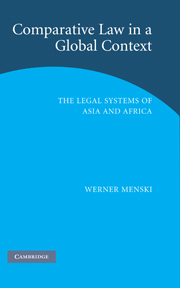Book contents
- Frontmatter
- Contents
- Preface and acknowledgments
- Table of cases
- Table of statutes
- List of abbreviations
- PART I Comparative framework
- PART II Regional comparisons in a global context
- Introduction
- 4 Hindu law: the search for appropriateness
- 5 Islamic law: God's law or men's law?
- 6 African laws: the search for law
- 7 Chinese law: code and conduct
- Conclusion: towards global legal realism
- References
- Index
7 - Chinese law: code and conduct
Published online by Cambridge University Press: 09 November 2009
- Frontmatter
- Contents
- Preface and acknowledgments
- Table of cases
- Table of statutes
- List of abbreviations
- PART I Comparative framework
- PART II Regional comparisons in a global context
- Introduction
- 4 Hindu law: the search for appropriateness
- 5 Islamic law: God's law or men's law?
- 6 African laws: the search for law
- 7 Chinese law: code and conduct
- Conclusion: towards global legal realism
- References
- Index
Summary
Compared to Hindu and African law, the study of Chinese law faces a much less hostile research environment. While China's size, volatility and importance remain a challenge, the codification of imperial Chinese laws impressed most Western observers and left little room for doubt that the ancient Chinese had law. This also provided sufficient reason for comparative lawyers to include Chinese law among the legal families, though its precise place in global taxonomies remains debated. Since the existence of law in China has never been challenged, the present chapter only briefly considers different scholarly representations. It focuses on key aspects of Chinese laws, highlighting the plurality of legal systems under the collective term ‘Chinese law’. The core element is visibly the imperial Chinese system of statutory laws, a manifestation of legal positivism which extended, with numerous modifications, from 221 BC until 1911. Equally important in social reality, however, are various uncodified systems of Chinese cultural norms and values, often subsumed (and thus not clearly enough distinguished as natural law and custom) under the label of morality or ‘Confucian ethics’. These Chinese postulates (Chiba, 1989: 180) are of immense relevance for understanding the social reality of ancient and modern Chinese law. They point to inherent plurality-consciousness also within Chinese law.
At first sight, the discourse on Chinese law appears to give far less importance to ‘custom’ than to the Codes or the philosophies of Confucian ethics, suggesting that this legal system is incomparably unique in its reliance on philosophy and state-made codes.
Information
- Type
- Chapter
- Information
- Comparative Law in a Global ContextThe Legal Systems of Asia and Africa, pp. 493 - 593Publisher: Cambridge University PressPrint publication year: 2006
